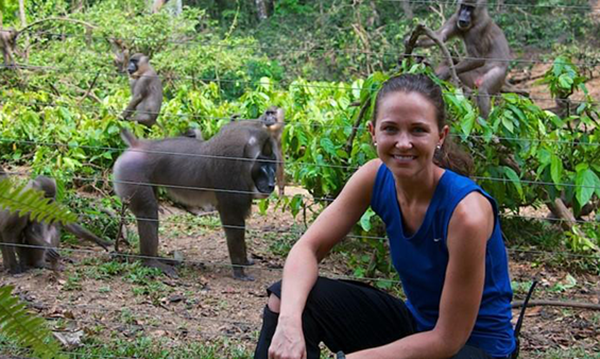
Lindsay Maess fulfilled a lifelong passion by working with monkeys, chimps and gorillas at US zoos and often returning to Africa for field research at the Pandrillus conservation organization and sanctuary for orphaned chimpanzees and endangered drill monkeys in Nigeria.
Life in the jungle can pose dangers we don’t face in the Western world. When Lindsay came down with malaria, it set her on a path to severe neurological issues, pain and trauma that took so many years of her life and, if it weren’t for her team of physicians at RUSH, could have ended her dream forever.
In April of 2016, Lindsay tested positive for a parasitic infection — Plasmodium falciparum.
The day after she began her third round of medication, Lindsay developed the worst headache of her life. The next few days brought shooting pain through her whole head, fever and bleeding sores all over her face. She felt like electricity was running through her tongue, lips, face and ears.
The pain spread to her shoulders, spine and left arm. She felt dizzy and confused, like she was intoxicated.
By the time Lindsay came to RUSH in January of 2019, her life had completely changed. She could barely swallow, talk or be social anymore — much less continue her life’s work with primates.
“To get through those years before coming to RUSH, I didn’t want to live through it,” Lindsay says. “The pain and vertigo were so intense, and I thought there was no way I could keep going like this.”
At RUSH, she would finally get relief, not only from one doctor, but from a community of physicians that worked together to address all her medical concerns.
Lindsay was referred to Dr. Ryan Smith, MD, a facial plastic surgeon at RUSH who specializes in treating facial nerve disorders. Assuring he would do whatever it took to help, he worked to tailor her treatment.
Lindsay also worked with Dr. Sandeep Amin, MD, a pain management physician at RUSH and University Pain Centers (UPC), to further treat her nerve pain and migraine. “Her nervous system was in hyper-drive mode when I first saw her, accounting for her facial issues, pain, headaches and difficulty swallowing,” Dr. Amin says.
To treat these issues, he used ultrasound imaging as a guide to place several nerve blocks, injecting anesthesia into specific nerves in Lindsay’s head and neck. “It’s almost like resetting the neurologic system and bringing it into normal drive mode,” Dr. Amin says.
“Dr. Smith and Amin, what’s so special about them is that they’ll sit and listen,” Lindsay says. “They’ve been so patient and persistent with me. Dr. Smith has probably missed lunch hours just from answering my many questions and letting me express everything I wanted to say. And Dr. Amin has been relentless at peeling back and treating the layers of my pain with compassion.”
